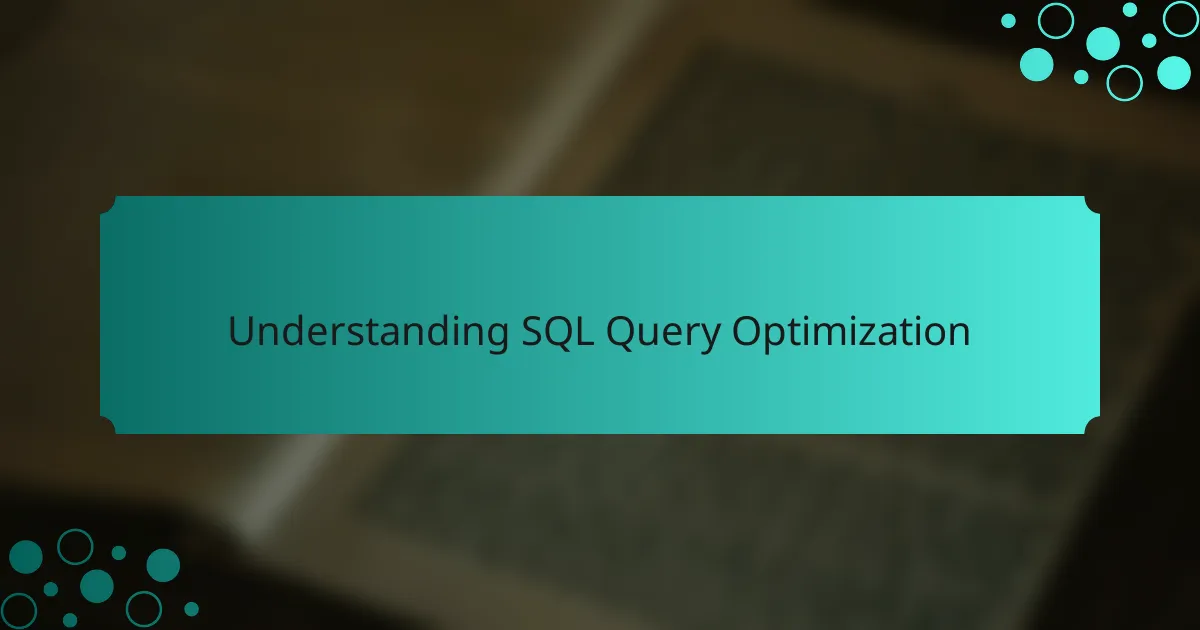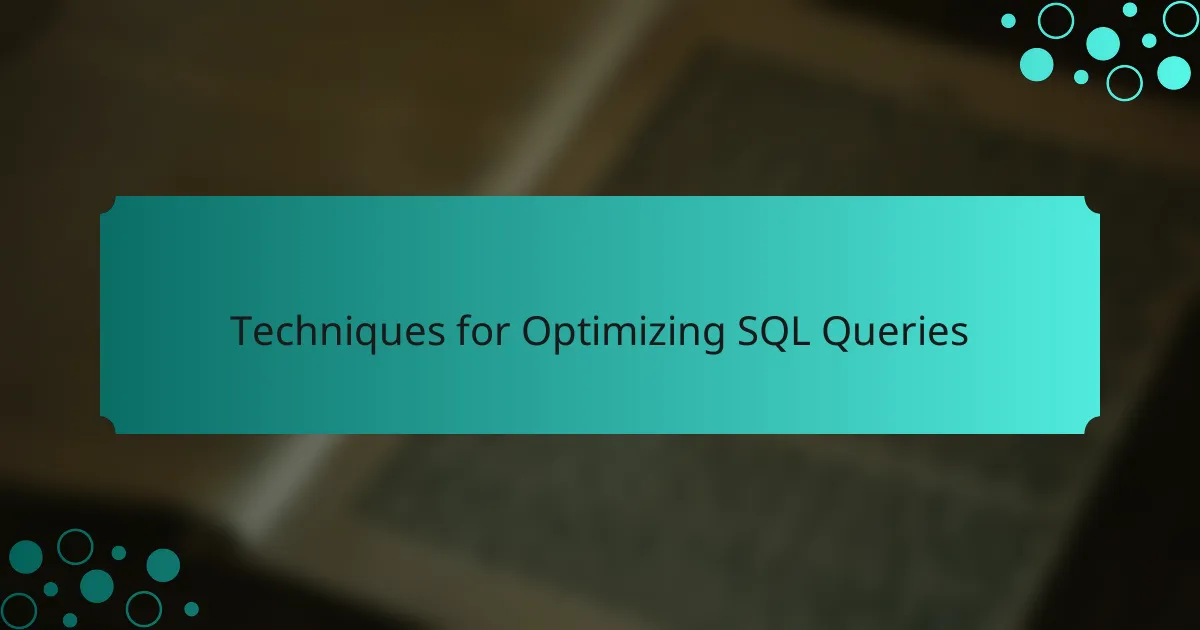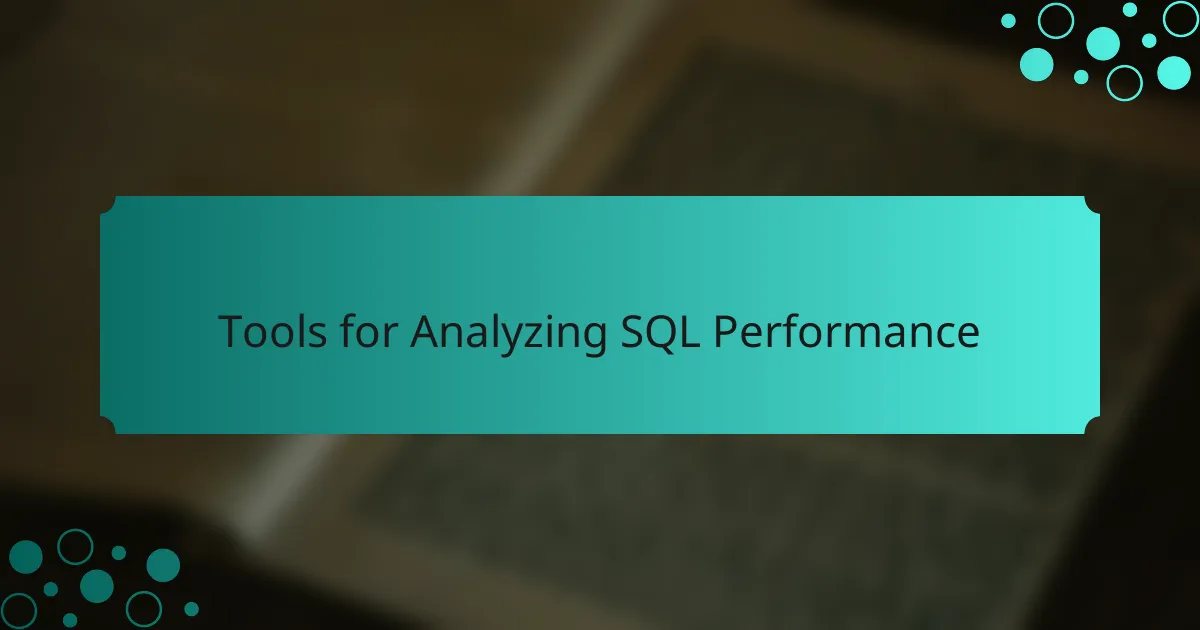Key takeaways
- Utilize indexes effectively to significantly reduce query execution time.
- Avoid using SELECT * to enhance performance by retrieving only necessary columns.
- Analyze execution plans with the EXPLAIN command to identify and address inefficiencies.
- Keep queries simple and modular to improve readability and performance, especially with large datasets.

Understanding SQL Query Optimization
Optimizing SQL queries in MySQL is crucial for improving performance and ensuring that applications run smoothly. I remember the first time I faced a sluggish database; queries were taking ages to return results, and it was incredibly frustrating. It dawned on me that understanding the principles of SQL query optimization was essential, leading me to explore various techniques that could not only speed things up but also reduce the load on the server.
Through my journey, I discovered several best practices that help in optimizing SQL queries effectively:
- Use Indexes Wisely: Indexes can drastically reduce query execution time. I found that creating indexes on frequently queried columns made a noticeable difference.
- Avoid SELECT *: Instead of pulling all columns, selecting only the necessary ones helps in reducing data retrieval time and improves performance.
- Limit Rows: By using
LIMIT, I was able to restrict the number of rows returned, which is helpful in handling large datasets. - Optimize Joins: I learned to minimize the number of joins in my queries, as they can add significant overhead. Keeping the number of joined tables to a minimum improved my query’s efficiency.
- Analyze Execution Plans: Using the
EXPLAINcommand gave me insights into how MySQL executed my queries, allowing me to tweak them for better performance.
These tactics transformed my approach to writing SQL queries, making my applications faster and more responsive.

Importance of SQL in MySQL
When I first began working with databases, I quickly realized how vital SQL is for managing data in MySQL. SQL, or Structured Query Language, serves as the backbone of MySQL, allowing you to retrieve, manipulate, and store data efficiently. Understanding SQL not only enhances your programming skills but also empowers you to optimize your queries for better performance, which ultimately saves time and resources.
In my experience, mastering SQL was a game-changer; I could streamline complex processes that once took hours to execute. The ability to write efficient queries transformed my approach to handling large datasets, making my work more effective and less frustrating. It’s incredible to see how a solid grasp of SQL can lead to significant improvements in data handling and decision-making.
Here’s a comparison of SQL’s role in MySQL versus other database management systems:
| Feature | MySQL | Other DBMS |
|---|---|---|
| Query Language | SQL | SQL, PL/SQL, T-SQL, etc. |
| Ease of Use | User-friendly with a wide community | Varies, some have steeper learning curves |
| Performance | Optimized for read-heavy operations | Performance may vary based on configuration |
| Support for Transactions | Yes | Varies, some support stronger transaction models |

Common SQL Query Performance Issues
Many developers, including myself at one point, encounter common SQL query performance issues that can drastically impact the efficiency of an application. For example, poorly designed queries often lead to slow performance. I vividly remember a time when I neglected to consider the difference between using indexed and non-indexed columns, leading to frustrating delays in data retrieval. It made me focus on the importance of indexing strategies.
Another frequent culprit is the use of suboptimal join conditions. I discovered that combining multiple large tables without clear join criteria could cause a significant slowdown. One particular experience involved hitting the execution limit while trying to join three hefty tables, which led to a valuable lesson about the necessity of judiciously selecting which tables to join and optimizing my query structure.
Lack of proper filtering is yet another issue that plagues many queries. Initially, I often retrieved entire datasets instead of narrowing them down. When I finally started using WHERE clauses effectively, the difference in speed was astonishing. Engaging with the tools MySQL provides, like EXPLAIN, helped me visualize this impact and further enhanced my understanding of optimizing SQL queries. Why struggle with slow responses when there are simple tweaks to get quicker results?

Techniques for Optimizing SQL Queries
Optimizing SQL queries can feel like an art form, and one technique I found invaluable is leveraging indexes properly. When I first started, I was puzzled by how indexing worked, but once I created indexes on the columns most frequently searched, it was like flipping a switch. The performance boost was immediate, and every time I added a new index, I felt a sense of accomplishment in making my queries more efficient.
Another practice that significantly improved my experience was avoiding the use of SELECT *. It took me a while to realize that pulling in unnecessary columns not only slows down the database processing but also complicates the data handling on the application side. By tailoring my selection to only what I needed, I often thought, “Why didn’t I do this sooner?” It’s a simple change, but the impact on performance was profound and immensely satisfying.
I also learned about the importance of analyzing execution plans through the MySQL EXPLAIN command. The first time I used it, I was amazed to see a visual representation of query execution. It opened my eyes to inefficiencies I hadn’t noticed before. Each revelation felt like peeling back layers of a complex puzzle, allowing me to refine my queries further. So, if you’re not using EXPLAIN yet, consider diving into it; the insights can be a game-changer for your SQL optimization efforts.

My Personal Optimization Strategies
One of my go-to strategies for optimizing SQL queries has been to carefully examine my indexes. In my early days, I often overlooked them, leading to sluggish query performance. Once I realized that adding appropriate indexes could drastically improve speed, it felt like finding the missing piece of a puzzle.
I’ve also learned the importance of keeping my queries as simple as possible. In a project where I was handling large datasets, I experimented with breaking complex queries into smaller, modular parts. This approach not only enhanced the readability of my code but also made it easier to identify bottlenecks.
Here are some strategies you’ve got to consider:
- Regularly review your indexes and remove unnecessary ones to reduce overhead.
- Use the EXPLAIN command to analyze query execution plans and identify slow parts.
- Limit the use of SELECT *; instead, specify only the columns you need.
- Use JOINs wisely; ensure that you’re joining on indexed columns to speed up retrieval.
- Keep your queries concise and modular to enhance readability and performance.

Tools for Analyzing SQL Performance
When it comes to analyzing SQL performance in MySQL, I’ve found a few tools to be particularly helpful. For instance, the MySQL EXPLAIN statement is invaluable; it provides insight into how MySQL executes queries, helping me identify bottlenecks. Additionally, I often rely on MySQL Workbench for its graphical interface, which makes visualizing query execution plans so much easier.
Another tool that I’ve had great success with is pt-query-digest. It allows me to analyze logs to understand which queries are causing the most strain on the server. I remember the first time I used it, I was amazed at how much clearer the performance issues became. It transformed the process of troubleshooting into a much more manageable task.
Here’s a comparison of some popular tools that I’ve used, which might help you choose the right one for your needs:
| Tool | Purpose |
|---|---|
| MySQL EXPLAIN | Analyzes how queries are executed |
| MySQL Workbench | Provides a graphical interface for query optimization |
| pt-query-digest | Analyzes query logs for performance issues |
